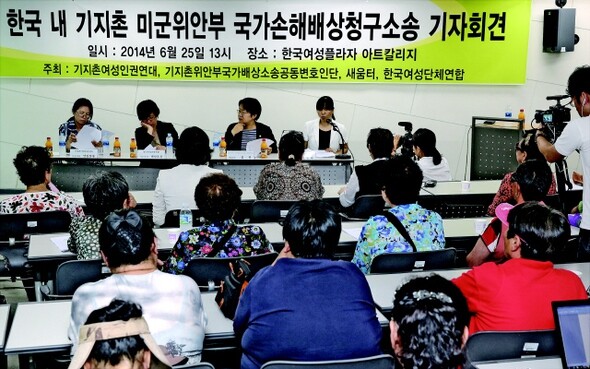hankyoreh
Links to other country sites 다른 나라 사이트 링크
Court awards damages to former “comfort women” near US military bases

A court has ordered the state to pay damages to former “comfort women” in the area around a US Forces Korea military base.
The court ruled that the state violated the law by forcibly keeping the women in isolation housing to control the spread of sexually transmitted diseases.
Judge Jeon Ji-won of Seoul Central District Court’s 22nd civil affairs division ruled in part for the plaintiffs and ordered the state to pay 5 million won (US$4,250) each in damages to 57 victims in a Jan. 20 decision on the case filed by 120 former US military base comfort women, including one identified by the surname Lee.
First, the court ruled the state to have violated the law by forcibly keeping women infected or designated as infected with STDs in detention facilities without any legal basis.
“Once admitted, the ‘comfort women’ were not allowed to leave the facility until they had been deemed fully cured. In some instances, there were apparently cases of injury when [women] attempted to leave the facility,” the court said.
The court also noted that victims “suffered and even died from side effects of penicillin shock” during their treatment.
The court also rejected the state’s claim that the five-year statute of limitation had passed. The state had argued that the statutory period for state liability for damages in connection with the US military comfort women had expired. The statute of limitations system restricts rights if not exercised within a certain period of time.
In response, the court said the victims “cannot be seen as having neglected to assert their rights in view of the authoritarian rule, exclusionary public sentiments toward US military comfort women, and the male-dominated and patriarchal society and culture at the time.”
“Illegal internment and other brutalization of citizens by a state authority is a violation of the law that must never happen,” the court said.
The ruling meant the acknowledgement of state liability in the cases of 57 women segregated prior to the Aug. 1977 enactment of enforcement regulations specifying the diseases subject to isolation.
But the court did not accept the plaintiffs’ claim that the state had also violated the law by establishing the base village in the first time “to allow prostitution to take place easily.”
“It is impossible to conclude that the victims were in a situation where they did not begin engaging in prostitution within the area of their own free will or could not leave,” the court said.
In response to the claim that the government acted illegally with its “purification campaign” managing prostitution in the are, the court said, “Such policies appear to have been intended for public interest purposes, including examining for and treating STDs for individuals involved in prostitution.”
By Hyun So-eun, staff reporter
Please direct questions or comments to [english@hani.co.kr]

Editorial・opinion
![[Editorial] Japan’s rewriting of history with Korea has gone too far [Editorial] Japan’s rewriting of history with Korea has gone too far](https://flexible.img.hani.co.kr/flexible/normal/500/300/imgdb/original/2024/0422/1717137715201877.jpg) [Editorial] Japan’s rewriting of history with Korea has gone too far
[Editorial] Japan’s rewriting of history with Korea has gone too far![[Column] The president’s questionable capacity for dialogue [Column] The president’s questionable capacity for dialogue](https://flexible.img.hani.co.kr/flexible/normal/500/300/imgdb/original/2024/0422/1517137717613239.jpg) [Column] The president’s questionable capacity for dialogue
[Column] The president’s questionable capacity for dialogue- [Column] Are chaebol firms just pizza pies for families to divvy up as they please?
- [Column] Has Korea, too, crossed the Rubicon on China?
- [Correspondent’s column] In Japan’s alliance with US, echoes of its past alliances with UK
- [Editorial] Does Yoon think the Korean public is wrong?
- [Editorial] As it bolsters its alliance with US, Japan must be accountable for past
- [Guest essay] Amending the Constitution is Yoon’s key to leaving office in public’s good graces
- [Editorial] 10 years on, lessons of Sewol tragedy must never be forgotten
- [Column] A death blow to Korea’s prosecutor politics
Most viewed articles
- 1Samsung barricades office as unionized workers strike for better conditions
- 2[Editorial] Japan’s rewriting of history with Korea has gone too far
- 3[Column] The president’s questionable capacity for dialogue
- 4Korean government’s compromise plan for medical reform swiftly rejected by doctors
- 5[Reporter’s notebook] Did playing favorites with US, Japan fail to earn Yoon a G7 summit invite?
- 6[Column] The clock is ticking for Korea’s first lady
- 7[Column] Are chaebol firms just pizza pies for families to divvy up as they please?
- 8What Israel’s ‘warning shot’ response to Iran means for Middle East tensions
- 9[Column] Has Korea, too, crossed the Rubicon on China?
- 10Korea protests Japanese PM’s offering at war-linked Yasukuni Shrine